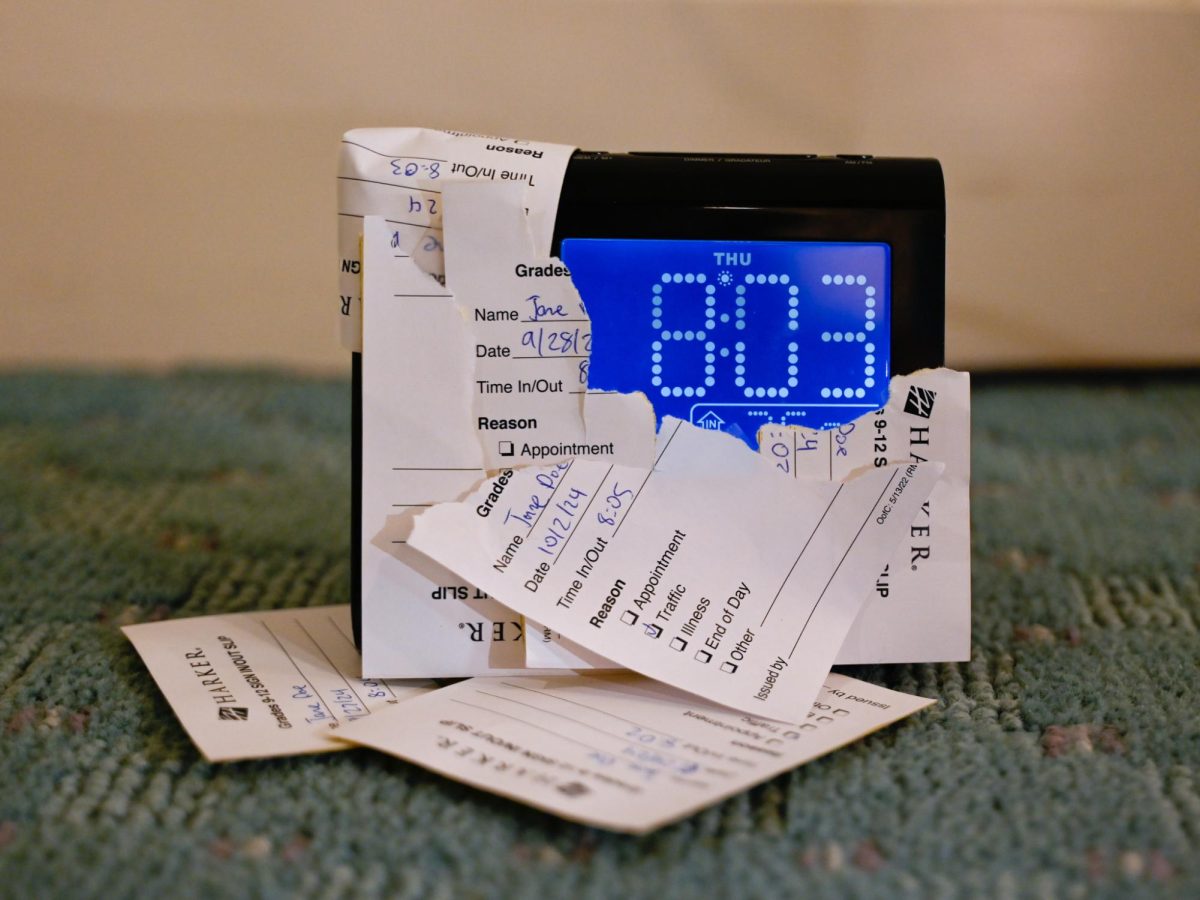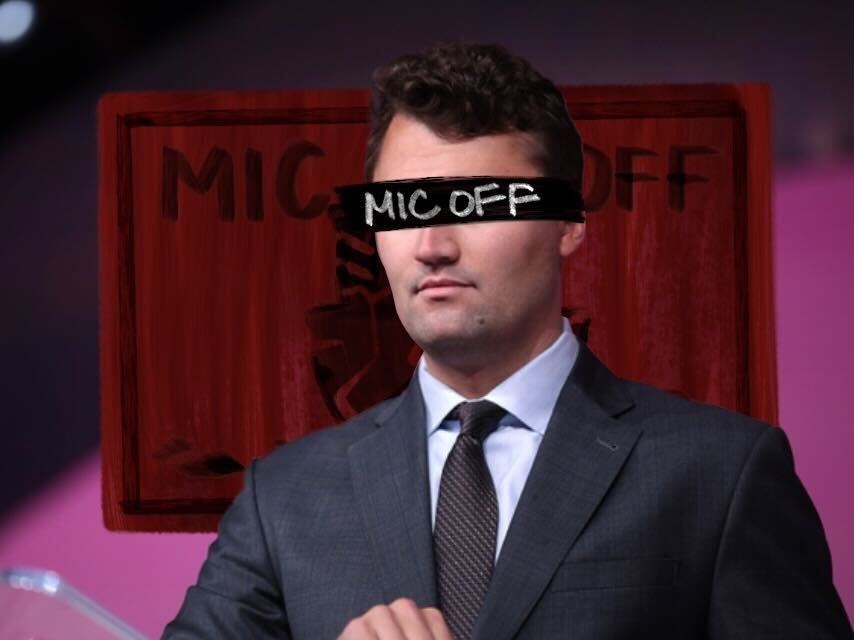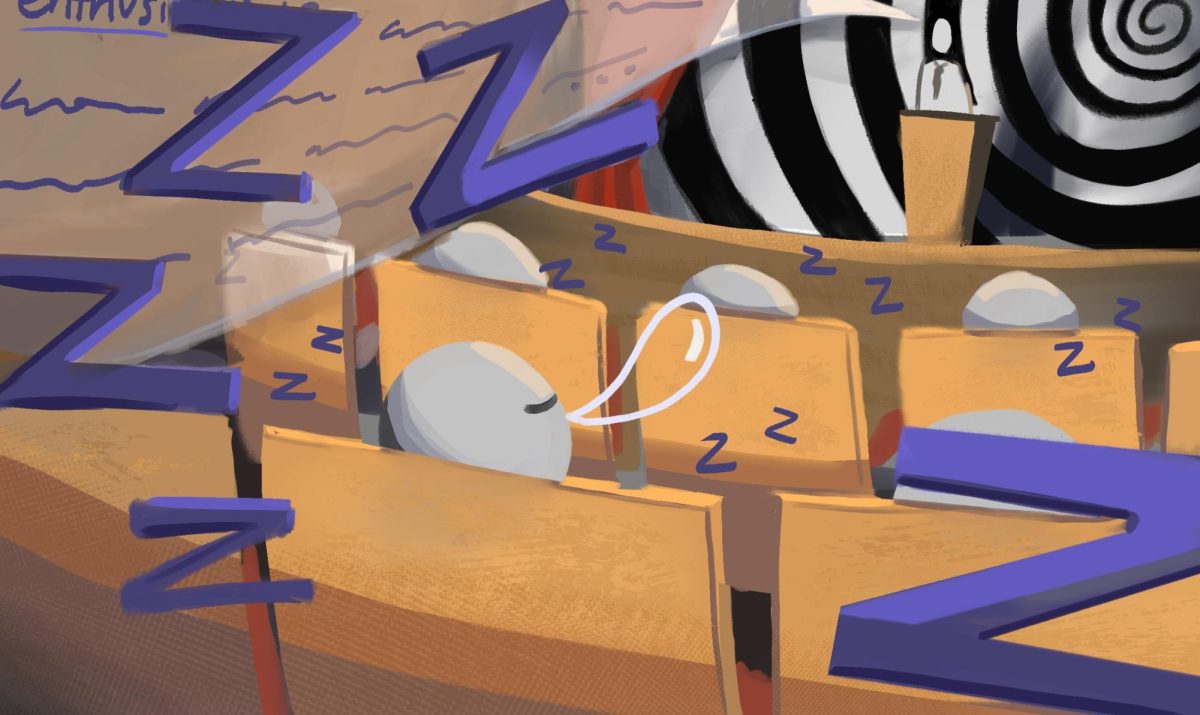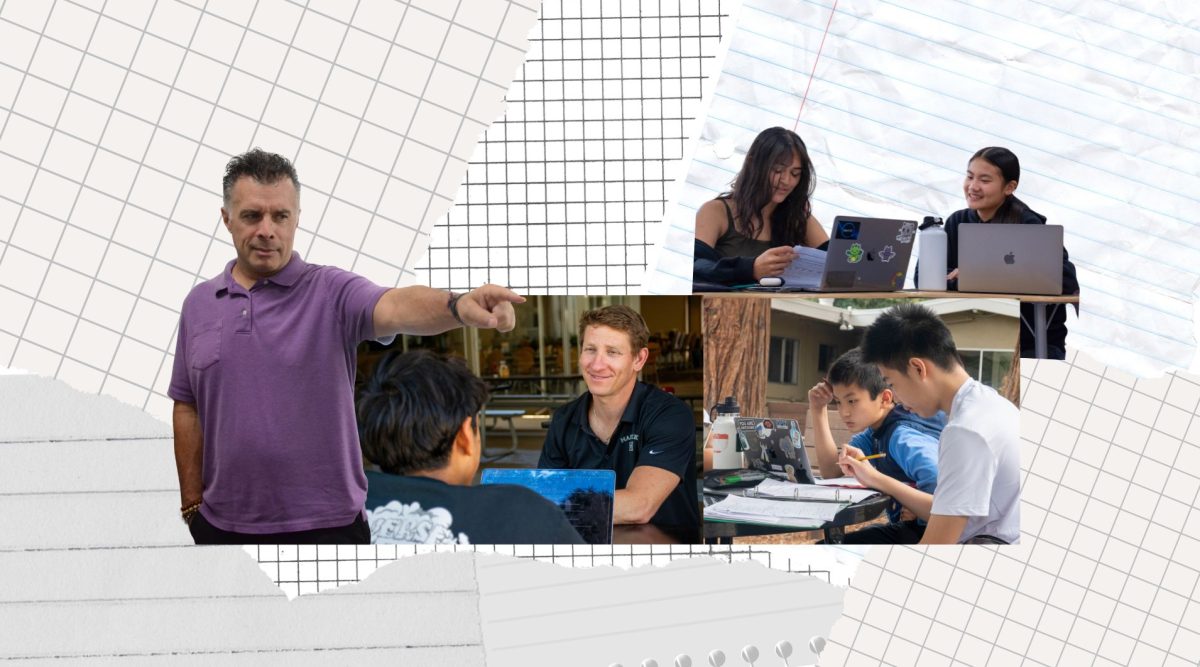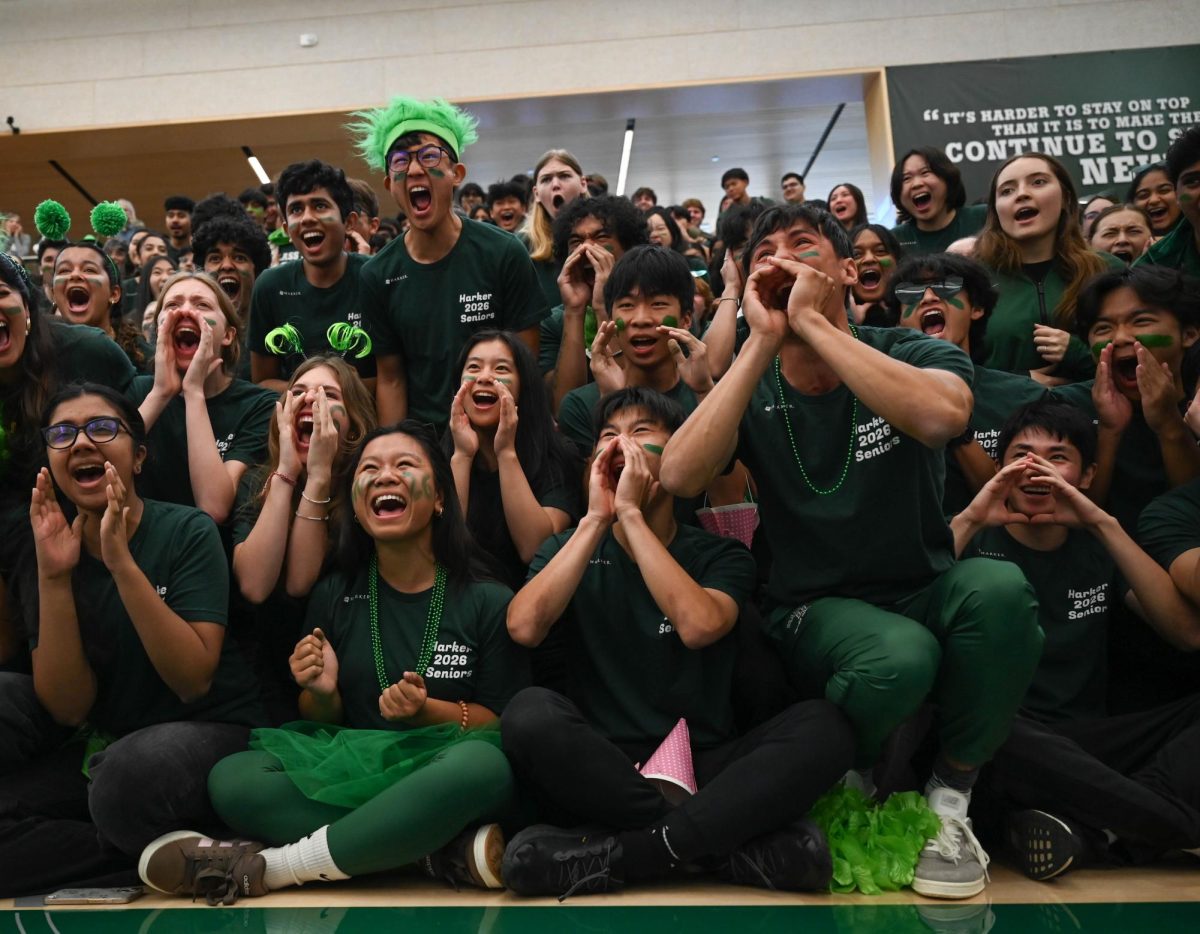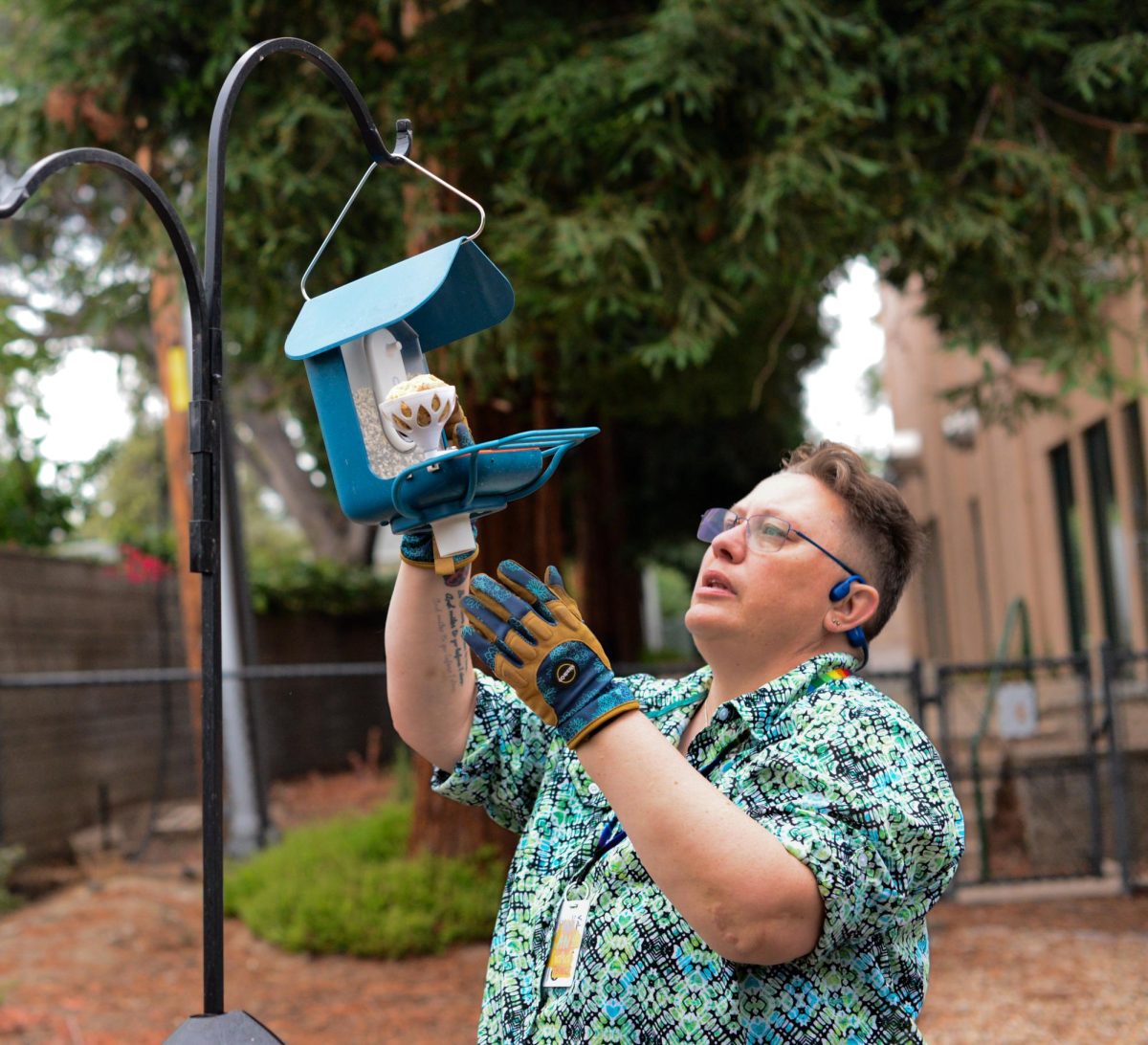It’s 7:58. Slinging my backpack around my shoulder, I bolt into campus as fast as my legs can carry me, my heart pounding in sync with every step. 7:59. I count down from 60. Rounding a corner, I spot the dark green letters of Dobbins Hall in the distance. 20 seconds left. I reach the stairs, lunging up the steps two at a time. 10. Tugging open the front door, I scramble across the hall. Five. The door to the classroom is just barely out of reach. One. The familiar five-note melody of the bell echoes through the building, right before I stumble into my first class of the day. Then, I’m hit with the dreaded words: “Go get a late pass.”
Currently, Harker requires all students who arrive late to grab a paper late slip from the front office in Main before heading to class. This system certainly helps promote and enforce punctuality. However, forcing students to retrieve a physical slip, especially from farther buildings like Shah, wastes valuable time that could otherwise be spent in class. The process should not exacerbate the very problem that it tries to solve.
Sure, an extra few minutes on top of a 10 to 20 minute delay doesn’t make too much of a difference. But according to a Harker student survey, 85.8% of 148 respondents report arriving less than 5 minutes late to class, barely missing the bell. For this majority, those additional minutes spent getting a late pass could mean missing out on important announcements that teachers make at the beginning of class, or even losing time on an exam.
On top of the squandered time, paper late passes waste resources. Physical slips serve little purpose once they leave the front desk. More often than not, they end up straight in the recycling bin.
To put it into perspective, every late slip spans around one-sixth the area of a standard 8-by-11 inch sheet of paper. An average of 20 slips per day over a 180 day school year accumulates to 600 sheets of paper, a little more than one ream of 500 sheets. Of course, that’s a small slice of the pie in comparison to Harker’s annual paper usage, but nonetheless, every bit of conservation counts.
Handing out paper late slips to tardy students at one location can also create unnecessary crowding. On days with remarkably bad traffic, lines at the front desk of Main can go out the door. As it stands, 56.8% of students feel that the current system is not efficient, and 85.8% would be open to a new system.
In an age where students submit assignments, papers and standardized tests online, transitioning the late slip system to a digital platform will make life easier for all parties involved.
For instance, directly connecting Infinite Campus entries with Harker’s internal attendance system eliminates the need for paper slips as an intermediary. Teachers can default to absence and mark students tardy with the click of a button as they come in. This process maintains the safety measure of face-to-face verification while also cutting down on time spent getting a late pass. Collaborations with on-campus student groups like HarkerDev may also prove useful in establishing a new system.
Given the current inconveniences associated with paper late slips, it’s time to reassess and take a step forward toward newer, more efficient alternatives.


















![“[Building nerf blasters] became this outlet of creativity for me that hasn't been matched by anything else. The process [of] making a build complete to your desire is such a painstakingly difficult process, but I've had to learn from [the skills needed from] soldering to proper painting. There's so many different options for everything, if you think about it, it exists. The best part is [that] if it doesn't exist, you can build it yourself," Ishaan Parate said.](https://harkeraquila.com/wp-content/uploads/2022/08/DSC_8149-900x604.jpg)




![“When I came into high school, I was ready to be a follower. But DECA was a game changer for me. It helped me overcome my fear of public speaking, and it's played such a major role in who I've become today. To be able to successfully lead a chapter of 150 students, an officer team and be one of the upperclassmen I once really admired is something I'm [really] proud of,” Anvitha Tummala ('21) said.](https://harkeraquila.com/wp-content/uploads/2021/07/Screen-Shot-2021-07-25-at-9.50.05-AM-900x594.png)







![“I think getting up in the morning and having a sense of purpose [is exciting]. I think without a certain amount of drive, life is kind of obsolete and mundane, and I think having that every single day is what makes each day unique and kind of makes life exciting,” Neymika Jain (12) said.](https://harkeraquila.com/wp-content/uploads/2017/06/Screen-Shot-2017-06-03-at-4.54.16-PM.png)








![“My slogan is ‘slow feet, don’t eat, and I’m hungry.’ You need to run fast to get where you are–you aren't going to get those championships if you aren't fast,” Angel Cervantes (12) said. “I want to do well in school on my tests and in track and win championships for my team. I live by that, [and] I can do that anywhere: in the classroom or on the field.”](https://harkeraquila.com/wp-content/uploads/2018/06/DSC5146-900x601.jpg)
![“[Volleyball has] taught me how to fall correctly, and another thing it taught is that you don’t have to be the best at something to be good at it. If you just hit the ball in a smart way, then it still scores points and you’re good at it. You could be a background player and still make a much bigger impact on the team than you would think,” Anya Gert (’20) said.](https://harkeraquila.com/wp-content/uploads/2020/06/AnnaGert_JinTuan_HoHPhotoEdited-600x900.jpeg)

![“I'm not nearly there yet, but [my confidence has] definitely been getting better since I was pretty shy and timid coming into Harker my freshman year. I know that there's a lot of people that are really confident in what they do, and I really admire them. Everyone's so driven and that has really pushed me to kind of try to find my own place in high school and be more confident,” Alyssa Huang (’20) said.](https://harkeraquila.com/wp-content/uploads/2020/06/AlyssaHuang_EmilyChen_HoHPhoto-900x749.jpeg)



